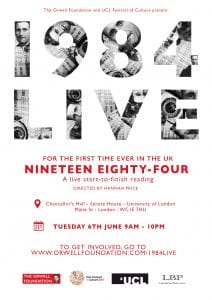Bringing Orwell to Life
By ucqajha, on 9 June 2017
Written by Catrin Harris, UCL student blogger
As part of UCL’s Festival of Culture, The Orwell Foundation staged a live start to finish reading of Orwell’s classic, 1984. Before the event, I caught up with the Foundation’s Director, Jean Sutton, as well as their Programmes Manager, Stephanie Le Lievre, to find out more.
CH: Firstly, what is the Orwell Foundation?
SL: The Orwell Foundation is a charity best known for awarding the Orwell Prize (the UK’s most prestigious prize for political writing). But we do much more than that: we use Orwell’s work to celebrate honest writing and reporting, uncover hidden lives, confront uncomfortable truths and, in doing so, promote Orwell’s values of integrity, decency and fidelity to truth. We do this through the Prizes, and also through free public events, lectures and debates such as our Orwell Lecture (given by Ian Hislop in 2016) and of course 1984 Live! We moved to UCL in 2016.
 CH: Where did the idea of a readthrough, and then immersive theatre, come from?
CH: Where did the idea of a readthrough, and then immersive theatre, come from?
SL: Live readings have been done before in the US and Australia, but never in the UK. When we found out about the Festival of Culture we thought it would be the perfect event to celebrate arriving at UCL. Once we had the idea, we realised that it had the potential to be more exciting than just a few people reading from a book in a room. We wanted it to have some kind of Artistic Direction, so we found Hannah Price, a brilliant theatre director who had real vision for what it could look like, and it snowballed from there.
CH: Orwell wrote six novels, why do you think 1984, along with possibly Animal Farm, is the most well-known?
JS: Animal Farm and 1984 are the best-known of Orwell’s novels because they are the best. They are barely novels – but fables, mythic. They are the product of his tremendous output of essays, commentaries, reviews, so the voice comes from non-fiction. But they also come straight from his experience of fighting fascism, seeing communism, being on the side of poor people, understanding that preserving the power of language to describe reality is almost the most important freedom.
CH: This event marks the 68th anniversary of the publication of 1984. How do you think the book resonates with a contemporary audience?
JS: 1984 works now because its themes are all around us: surveillance, the capacity to have a private life, meaningful and true feelings – not soap opera postured pouting, the capacity of ideology to create perceptions, the shaping of ideas by the control of technology, the sense that people may live in a manipulated world. These all have contemporary twists – people now commodify their own private lives and display their ‘private’ feelings for everyone – and perhaps in doing so lose touch with their sense of themselves as they pursue fashionable identities. But the alarming sense of the slip and slide of small rights and proprieties that may lead to tyranny is also palpably in the air.
CH: How did you decide who to invite to read?
SL: We wanted all the readers to reflect aspects of Orwell in some way. Orwell was political (though not definitively on the ‘left’ or the ‘right’), but also literary, interested in culture and nature, dedicated to clarity. Thus, we have writers, journalists, politicians, actors, activists and members of the public. We also wanted to represent a whole variety of perspectives. Some of our readers are: Ken Loach, Dame Harriet Walter, David Olusoga, Jack Monroe, Peter Hitchens, Gary Younge, Orwell’s son, Caroline Criado-Perez, Simon Schama and Rick Edwards.
Watch the event back
More than 8,000 people tuned in across the globe to watch the event live. Don’t worry if you missed it – you can watch it back on YouTube.
 Close
Close

